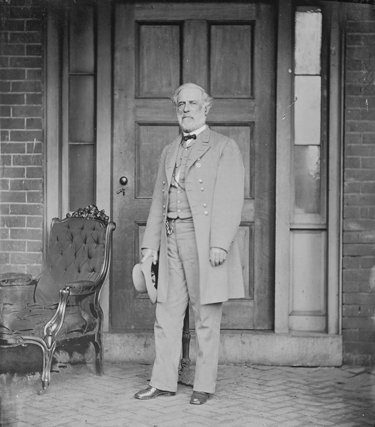The Left’s War on Robert E. Lee
Charlottesville, Critical Racial Studies, Left Refighting the Civil War, Left's War on Statues, Lewis & Clark, Robert E. Lee

“He was a foe without hate; a friend without treachery; a soldier without cruelty; a victor without oppression, and a victim without murmuring. He was a public officer without vices; a private citizen without wrong; a neighbour without reproach; a Christian without hypocrisy, and a man without guile. He was a Caesar, without his ambition; Frederick, without his tyranny; Napoleon, without his selfishness, and Washington, without his reward.” Benjamin Harvey Hill (former Confederate Senator from Georgia), 1874.
——————————
“He had a calm and collected air about him, his voice was kind and tender, and his eye was as gentle as a dove’s. His whole make-up of form and person, looks and manner had a kind of gentle and soothing magnetism about it that drew every one to him and made them love, respect, and honor him.” Samuel R. Watkins, veteran of 1st Tennessee Regiment, 1881.
Last weekend, the communist city council of Charlottesville removed Lee’s statue and, as a scorched earth policy, even demolished its base.
Christopher Caldwell, in Claremont Review, marvels at how quickly a minority mob of radicals has seized power nationally and successfully enforced its own crude and simplistic ideological perspective.
As recently as 2014, biographer Michael Korda was able to describe Lee in Clouds of Glory as “universally admired even by those who have little or no sympathy toward the cause for which he fought.” Korda might have been thinking of Dwight Eisenhower, who considered Lee one of the four greatest Americans and hung his portrait in the Oval Office alongside those of the other three (Benjamin Franklin, George Washington, and Lincoln). “General Robert E. Lee was, in my estimation, one of the supremely gifted men produced by our Nation,” Eisenhower wrote, “selfless almost to a fault and unfailing in his faith in God. Taken altogether, he was noble as a leader and as a man, and unsullied as I read the pages of our history.”…
Lee had a good 20th century. The greatest biography of him remains Freeman’s Pulitzer-winning life—heroic and punctilious, if a bit purple for modern tastes. It has had its measured defenders and its measured detractors, though almost all readers accepted its assessment of Lee’s importance.
In our own century, things have changed. The urgent, invective-filled attacks on Lee that are beginning to appear would have seemed overheated even if the Civil War were still going on. …
The reassessment of Lee’s position in American history has almost everything to do with a shift in the way we talk about race. This shift has come about the way most recent shifts in intellectual fashion have—not so much because of any new historical information but because of the arrival in journalism and academia, by a process so gradual as to be almost imperceptible, of the bureaucratic oversight and litigative intimidation enabled by the Civil Rights Act of 1964.
Stonewall Jackson’s monument was pulled down along with Lee’s, and the tricoteuses of Charlottesville celebrated their victory by voting unanimously to add their city’s famous statue of explorers Lewis & Clark to the purge list.



